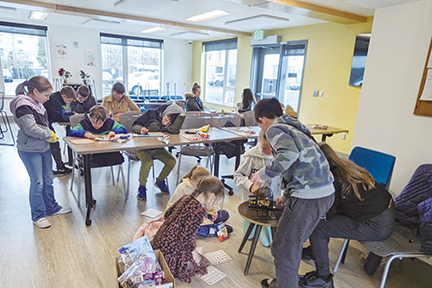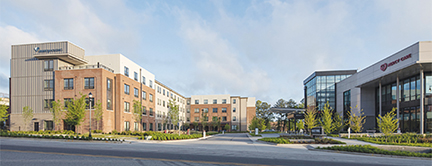By JULIE MINDA
Since the Sisters of Mercy founded Mercy Housing in 1981, the nonprofit, affordable housing ministry has partnered with Catholic health systems and facilities. Given that the housing and health care organizations commonly share sponsorship, leadership, purpose, vision and values, alignment has come naturally.
As the nation's largest affordable housing provider with nearly $4.9 billion invested in affordable real estate development, Mercy Housing is expanding its strategies to achieve greater impact in improving people's lives. Both through direct real estate development and investments through Mercy Community Capital, its affiliated community development financial institution, Mercy Housing is improving affordable housing in 41 states. For the past four decades, Mercy Housing has been balancing growth with service delivery, allowing people to live in safe homes with dignity.

Ismael Guerrero joined Mercy Housing in 2020 as president and chief executive. He spoke to Catholic Health World about the close alignment between the Catholic Church's housing and health care ministries and how those ministries can and should expand their partnership. The interview has been edited for length and clarity.
Why are Mercy Housing and Catholic health care working together?
Bringing housing and health care closer to communities with limited resources is of mutual interest between Mercy Housing and Catholic health care. We are exploring how to leverage our core competencies. Mercy Housing excels at building and managing affordable housing as well as developing trusted relationships with people who call Mercy Housing home. Our health care partners excel at providing preventative services, wellness programs and medical services to people in those same communities.

Today we understand that to control health care costs you have to pay attention to what is happening outside the clinical environment. One of the key social determinants of health is stable housing. Both Mercy Housing and Catholic health care providers are looking at the whole person. With the Housing First model that we use, it is important to start with housing stability then address other needs, because issues like financial mobility, mental, physical and emotional wellness, and academic achievement will not improve without housing stability.
What are some challenges that could interfere with partnerships in these areas?
We're all in a different world because of the pandemic. The devastating disruptions to our health care system partners are well known. Collectively, we are defining a new normal. Many of our existing partners speak of two major challenges — recruiting staff and increased costs of hospital operations.
For Mercy Housing, we are challenged by our mission to increase the inventory of affordable housing through real estate development — which takes years — and the massive increases in construction costs.
Our shared founding communities were driven by mission and strong values. They were called to serve those most in need, to do better. This history allows us to overcome many of the challenges that might exist with other real estate partners.
What types of financing does Mercy Housing use for its properties?
In today's economic environment, we must be creative. Every deal requires multiple layers of financing to build affordable housing. We're using federal subsidies and tax credit investments. Many banks are motivated by the Community Reinvestment Act but there can still be a gap in financing. We partner with state, local, and regional partners to bring credits and other resources to Mercy Housing communities. In many cases, philanthropic partners donate financial gifts for capital projects or to pay for resident programs.
Beyond money investments, how else are ministry providers supporting affordable housing expansion?
Mercy Housing enjoys many existing partnerships with Catholic health care partners that began with the gift of land. Hospitals sometimes find they have obsolete buildings or excess land that could be used for affordable housing. These are often uncovered as providers update their health needs assessments and strategic business reviews. Some of our partnerships are complex, reserving some beds for respite care in the new affordable housing that is built with donated land or buildings. In some cases, they provide free wellness and critical medical care to Mercy Housing residents on-site or at a shared facility.
How do those alignments lead to greater partnership in helping vulnerable people?
When Mercy Housing can focus on our core business, housing, and partners focus on their core business, health care, our shared clients, the most vulnerable people, benefit.

Together we can bring services closer to them in a culturally relevant way and in a way that meets them where they live. This approach increases the probability of them taking advantage of preventive programs, keeping them out of emergency rooms and urgent care. Educating and empowering them to drive their wellness journey keeps them in school and on the job. It provides them with the tools to live with dignity and change their life trajectory.
At the end of the day people who are stably housed are receiving health services that ultimately improve their long-term life outcomes.
What grounds the partnerships between Mercy Housing and Catholic health ministry organizations?
Partnerships have really been part of the Mercy Housing legacy since the beginning. That legacy comes from the fact that we were sponsored by seven communities. The sisters were passionate, fierce and committed to the ministries of housing and health care. They recognized that what these ministries are doing is really hard work and it can't be done alone. You have to invite others in.
Today, the challenges have evolved, and we must think big on a systems level. The people who are most vulnerable are falling through the cracks of our systems. The need for us to work together is greater than ever.
What are some examples of those partnerships between Mercy Housing and Catholic health organizations?
In Atlanta, there is a strategic partnership we've jointly developed with Mercy Care, which is part of Trinity Health. Mercy Care was expanding its federally qualified health center and Mercy Housing was looking for opportunities to add housing in Chamblee, Georgia. Mercy Care partnered with us and we co-developed affordable housing for seniors adjacent to Mercy Care's health center.
And in Vancouver, Washington, PeaceHealth was building a new campus and also saw a need for affordable housing. PeaceHealth had excess land and we weren't yet in Vancouver. It was a natural partnership. So on that excess land we built our first family housing development in Vancouver. We're looking to grow and do more with PeaceHealth.
These are just two examples of where we're increasingly seeing our mutual interests align and seeing mutual benefit. We have common interests. We're sitting down with existing and new partners asking how we can multiply our impact.
What does partnership between Mercy Housing and Catholic health care providers look like from a practical standpoint?
There is mutual learning between Catholic health care providers and Mercy Housing. For example, Mercy Housing provides permanent supportive housing for people who are homeless. They also are high users of emergency services, which has high costs. As we create permanent supportive housing, we see they also are patients and we ask how they can stay stably housed and healthier.
We look at how to get preventive care to them. Perhaps there's a case manager in a housing unit. Perhaps there's transportation we coordinate to medical care. It's a value-add for the health care provider. Through partnerships between Mercy Housing properties and Catholic health care and senior care, we're working on how to help manage people's health care needs day to day and ensure they get care early instead of relying on the emergency room.
With our families living in Mercy Housing sites, we're learning that they need good nutrition, healthy food and management of chronic conditions so that they don't lose their employment. They need child care. We're looking at how we can use the hospitals' community health needs assessments, how we can partner with hospitals and how we can structure partnerships for the residents of our housing sites. We align with the hospitals around the needs of the community. It's mutual learning and mutual alignment.
There's clear understanding on both our parts that there is a need. So now it's about matchmaking. We're getting the right people in the room from Mercy Housing and from the Catholic health partner and we're seeing the magic happen.
Those conversations are happening and it's exciting because we can take those success stories and scale them across our markets. There's cross-learning and collaboration.
Across the U.S., Catholic health systems and facilities have supported Mercy Housing sites in their communities with both financial and in-kind support.
A sampling of these partnerships includes:
CommonSpirit Health
- St. Elizabeth Community Hospital in Red Bluff, California, transferred its sponsorship of two low-income senior housing developments to Mercy Housing more than two decades ago. The hospital also donated an unused hospital wing to Mercy Housing for use as a nonprofit community service center.
- Mercy Medical Center in Redding, California, is providing land under an 80-year lease to Mercy Housing. On the land, the housing organization has built affordable senior housing tailored to frail elders.
- Methodist Hospital of Sacramento, California, provided land at below-market cost to Mercy Housing for the 1997 development of 66 housing units for elder adults. Sacramento's Mercy Foundation provided grant dollars for a transportation program for Mercy Housing clients.
- In Sacramento, Mercy Foundation also provided funding to Mercy Housing toward a complex of cottages for people experiencing homelessness. The foundation also joined with CommonSpirit's subsystem Dignity Health to fund a community gathering space for the property's residents.
- In Folsom, California, Dignity Health provided multiple loans to Mercy Housing to acquire, rehab and operate 10 properties for low-income families and for families of prisoners. Mercy Hospital of Folsom helped to provide a nearby clinic to tend to local people's health. Mercy Hospital of Folsom also donated land adjacent to the hospital for Mercy Housing to develop 138 units of senior housing.
- St. Mary's Medical Center in San Francisco purchased a city block to renovate an unused hospital into an affordable senior living complex. St. Mary's then transferred ownership to Mercy Housing.
- In Santa Cruz, California, Dignity Health provided a loan to help Mercy Housing build an affordable housing complex.
- In Oxnard, California, St. John's Regional Medical Center supported an affordable housing Mercy Housing complex with a loan and land donation. Later Dignity Health provided a short-term, low-interest loan to Mercy Housing to buy a contiguous plot to develop affordable housing for seniors. The property is called Casa Merced.
- In Santa Barbara, California, Dignity Health provided funding for affordable family housing.
- Dignity Health helped fund the development of Mercy Housing's Southern California office.
- California Hospital Medical Center of Los Angeles leased a nearby parking lot it owns to Mercy Housing and donated the revenue from the lease to the development of affordable family housing units.
- Mercy Hospital Bakersfield in California supported Mercy Housing in developing an affordable family housing complex and the hospital partners to offer outreach services to Mercy Housing residents. The hospital also provides outreach services at another Mercy Housing affordable housing property.
- In San Diego, Dignity Health helped Mercy Housing attain grants to lay the groundwork for converting some buildings at Scripps Mercy Hospital into housing for people with disabilities and for elderly people. Scripps Mercy provided a long-term, no-cost lease of the property. (Scripps Mercy is not part of CommonSpirit.)
- The foundation of St. Joseph's Hospital and Medical Center in Phoenix provided grant dollars to help establish Mercy Housing Southwest in that community.
- In Mesa, Arizona, Dignity Health provided a loan to cover a portion of the land costs for a Mercy Housing complex that includes affordable senior and family housing.
- Dignity Health East Valley in Central Arizona has helped provide on-site residential clinics, health education and other services to Mercy Housing clients.
- CHI Health has funded a health navigation program for Mercy Housing clients in Omaha, Nebraska.
Ascension
- Ascension Saint Mary – Kankakee in Illinois provided a capital grant to help close a funding gap for a senior residence facility Mercy Housing constructed.
Bon Secours Mercy Health
- Bon Secours Mercy has aided Mercy Housing as it has entered into a new market, Greenville, South Carolina. This included connecting the Mercy Housing leadership to housing agencies.
PeaceHealth
- PeaceHealth provided land and a capital donation to support Mercy Housing in building an affordable family housing complex in Vancouver, Washington. The land is next to the PeaceHealth Southwest Medical Center campus.
Trinity Health
- A Trinity Health affiliate called Mercy Care partnered with Mercy Housing to support an affordable housing site near Atlanta. The partnership includes working to provide health services to Mercy Housing clients.
